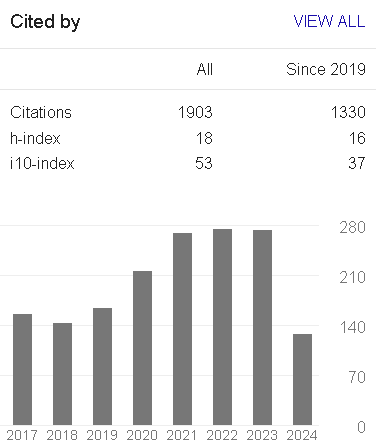A Survey on Graphical Programming Systems
Keywords:
Graphical programming, Visual programming, Data-flow programming, End-user programmingAbstract
Recently there has been an increasing interest in the use of graphics to help programming and understanding of computer systems. The Graphical Programming and Program Simulations are exciting areas of active computer science research that show the signs for improving the programming process. An array of different design methodologie s have arisen from research efforts and many graphical programming systems have been developed to address both general programming tasks and specific application areas such as physical simulation and user interface design. This paper presents a survey of t he field of graphical programming languages starting with a historical overview of some of pioneering efforts in the field. In addition this paper also presents different classifications of graphical programming languages.
References
“LabVIEW”, http://www.ni.com/labview, January 23, 2014.
Ivan Edward Sutherland, “Sketchpad: A manmachine graphical communication system”,University of Cambridge, September 2003.
“Behave”, http://xenia.media.mit.edu/~mt/behave/behave.html, January 23, 2014.
David Canfield Smith, “A Creative Programming Environment”, MIT Media Labs, 1975.
Zoe Drey,Charles Consel, “Taxonomy -driven prototyping of home automation applications: A novice-programmer visual language and its evaluation”, Journal of Visual Languages and Computing, Elsevier, August 2012.
Mehdi Manshadi, Daniel Gildea, James Allen, “Integrating Programming by Example and Natural Language Programming”, Department of Computer Science, University of Rochester, Rochester, NY 14627.
J W Carlson, “ A Visual Language for Data Mapping”, Workshop on Domain-Specific Visual Languages, Tampa Bay, FL, U.S Department of Energy, August 2001.
Eugenio J. Marchiori, Angel del Blanco, Javier Torrente, Ivan Martinez-Ortiz, Baltasar Fernandez Manjon, “A visual language for the creation of narrative educational games”, Journal of Visual Languages and Computing, Elsevier, September 2011.
Gary Rommel, “Work in Progress - Using A Graphical Programming Language Teach to Microprocessor Interfacing”, ASEE/IEEE Frontiers in Education Conference,October 2005.
Ye Weijun, Ying Shi, Zhao Kai, Ni Youcong, “Design and Implementation of Semantic Programming Language Graphical Edit Tool”,
International Conference On Computer Design And Appliations, IEEE, 2010.
Yubin Liu, Li Wu2 and Xinfa Dong, “Research on Controls-Based Visual Programming”, Second International Conference on MultiMedia and Information Technology, IEEE, 2010.
Gilbert Tekli, Richard Chbeir, Jacques Fayolle, “A visual programming language for XML manipulation”, Journal of Visual Languages and Computing, Elsevier, February 2013.
Chang, S.-K., “Principles of Visual Programming Systems”, Prentice Hall, New York.
Teboul, O., Kokkinos, I., Simon, L., Koutsourakis, P., & Paragios, N. (2011, June). Shape grammar parsing via reinforcement learning. In Computer Vision and Pattern Recognition (CVPR), 2011 IEEE Conference on (pp. 2273-2280). IEEE.
Ng, K. Mun, and Z. Alam Haron. " Visual microcontroller programming using extended Ssystem Petri nets." WSEAS Transactions on
Computers 9.6 (2010): 573-582.
Fahmy, Hoda, and Dorothea Blostein. "A survey of graph grammars: Theory and applications."Pattern Recognition, 1992. Vol. II. Conference B: Pattern Recognition Methodology and Systems, Proceedings. 11th IAPR International Conference on. IEEE, 1992.
Boshernitsan, Marat, and Michael Sean Downes. Visual programming languages: A survey. Computer Science Division, University of
California, 2004.
Zhao, Chunying, Jun Kong, and Kang Zhang."Program behavior discovery and verification: A graph grammar approach." Software Engineering, IEEE Transactions on 36.3 (2010): 431-448.
Dobesova, Zdena. "Visual programming language in geographic information systems." Proceedings of the 2nd international conference on applied informatics and computing theory. World Scientific and Engineering Academy and Society (WSEAS), 2011.
Kosar, Tomaž, et al. " Comparing general-purpose and domain-specific languages: An empirical study." Computer Science and Information Systems 7.2 (2010): 247-264.
Kosar, Tomaž, Marjan Mernik, and Jeffrey C. Carver. "Program comprehension of domainspecific and general-purpose languages: comparison using a family of experiments."Empirical software engineering 17.3 (2012): 276-304.
Rogers, Yvonne, Helen Sharp, and Jenny Preece. Interaction design: beyond human-computer interaction. John Wiley & Sons, 2011.
Ashrov, Adiel, et al. "A use-case for behavioral programming: architecture in JavaScript and Blockly for interactive applications with cross-cutting scenarios." Science of Computer Programming (2014).
Fowler, Allan, and Brian Cusack. "Kodu game lab: improving the motivation for learning programming concepts." Proceedings of the 6th International Conference on Foundations of Digital Games. ACM, 2011.
“App Inventor”,http://appinventor.mit.edu/explore/, March 29, 2014
Downloads
Published
How to Cite
Issue
Section
License
Copyright (c) 2014 COMPUSOFT: An International Journal of Advanced Computer Technology

This work is licensed under a Creative Commons Attribution 4.0 International License.
©2023. COMPUSOFT: AN INTERNATIONAL OF ADVANCED COMPUTER TECHNOLOGY by COMPUSOFT PUBLICATION is licensed under a Creative Commons Attribution 4.0 International License. Based on a work at COMPUSOFT: AN INTERNATIONAL OF ADVANCED COMPUTER TECHNOLOGY. Permissions beyond the scope of this license may be available at Creative Commons Attribution 4.0 International Public License.


